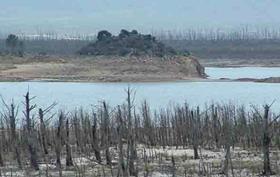
In South Africa, Hortgro has said the predicted long-term dry weather trends in the Western Cape region of the country has serious implications for the farming of deciduous fruit crops.
The organisation has reacted to the Western Cape region having been declared a disaster area by the local government because of what has been called the worst drought in the region for almost a century.
The Western Cape Government says stock farmers and irrigation farmers are among the hardest hit by the drought.
Reacting to the latest announcements, which include further restrictions and control of the water resources of the Western Cape in the event of substantial rain not arriving soon, Hortgro’s chief executive director Anton Rabe said the current problem cannot only be solved by cuts on agricultural water quotas.
“The whole community will have to re-think its water usage and alternative water resources must be unlocked, and recycling of water should be phased in,' he noted. 'Water policies will have to change and dams must be enlarged to save more winter rainfall. Water storage should be adapted so that water is stored for longer periods than just one season - given that there will be longer periods of droughts in future, possibly followed by floods.”
Rabe predicted that short-term crops would become very expensive, especially in the Western Cape. “Water for agricultural use will be prioritised for long-term crops, but short-term crops like vegetables can be imported from other parts of the country.
“Biomass production, which is both the growth of the tree and fruit yield, relates directly to the availability of water during the growing season since trees cannot photosynthesize and produce carbohydrates in the absence of water,” explained professor Wiehann Steyn, Hortgro’s crop production manager.
“At moderate water stress, as experienced during the previous two seasons when water availability in some regions came under pressure, young trees grow less and mature trees carry fewer and smaller fruit. Fruit quality is also reduced under moderate water stress due to increased levels of sunburn and internal defects that result in fruit being unsuitable for fresh consumption and long-term storage,' Steyn outlined.
He added that severe water stress may be experienced during the 2017/18 season if insufficient winter rainfall does not allow fruit growers to replenish their water storage or if heavy restrictions are imposed on agricultural irrigation water use in schemes that compete with the water needs of the City of Cape Town.
“When irrigation water is restricted below 50 per cent of the needs of the trees, profitable fruit farming becomes impossible due to the progressive impact,' Steyn continued. 'If irrigation water becomes very limited, growers may need to remove all fruit from the trees, rip out less productive orchards to save water for remaining orchards or even remove the aboveground parts of trees to try to keep at least the root system alive.”
The table grape industry is also expected to comment on the situation, but individual growers in the Hex River region, the Berg River and the Olifants River are reported to be extremely worried about the situation and the longer term effects on their vines if they do not receive sufficient rain soon.
Latest reports put the combined average water levels of the Western Cape’s main storage dams at just above 15 per cent, with fast growing population of Cape Town competing directly with agriculture for the use of these resources.
While the Cape citrus growers, where most of the fruit exported to the US originates from, are presently still harvesting a good crop, which is of excellent quality due to the dry conditions, they are also worried about what will happen next year.
Further afield, in the Eastern Cape, the drought also has an effect with the export forecast previously already having been reduced.



